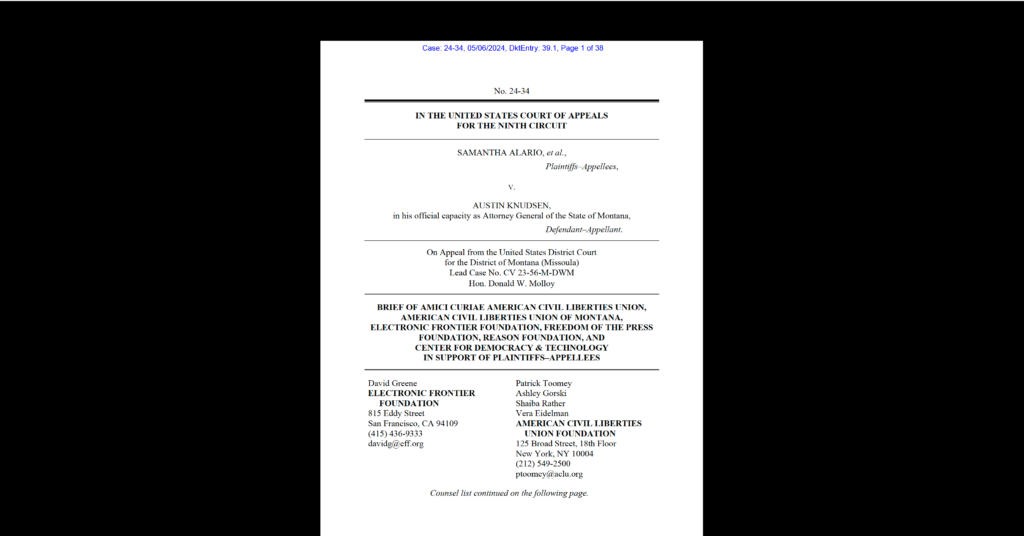Free Expression, Open Internet
CDT Joins Letter to Mississippi Attorney General: Mandated Search Filtering and Site Blocking are Still Bad Ideas

Today, the Center for Democracy & Technology joined 12 other organizations in reminding Mississippi Attorney General Jim Hood of the overwhelming opposition to the website blocking and search filtering that the Stop Online Piracy Act (SOPA) would have mandated. The letter responds to a litigation strategy, in apparent coordination with the Motion Picture Association of America (MPAA), to accomplish SOPA’s goals through subpoenas and threatened legal action under Mississippi state law.
As CDT has explained, the enforcement tools that Hood is seeking would harm free expression and Internet security. They would also threaten the successful legal framework that has made America the leader of the Internet economy.
That framework rests on two pillars. Section 230 of the Communications Decency Act allows Internet intermediaries, like websites and search engines, to display third-party content without becoming the legally responsible “publisher” of that content. For copyright specifically, the Digital Millennium Copyright Act (DMCA) provides a notice-and-takedown regime that shields intermediaries from liability for infringing content, so long as the intermediary expeditiously removes the content in response to a notice from the rightsholder or its agent. The balance struck by these laws has allowed user-generated content — and the Internet generally — to thrive.
The Attorney General’s letters to Google and 79-page subpoena ignore this legal framework, and federal preemption in the area of copyright, entirely. Instead, they seek to give state attorneys general and rightsholders the authority to curate and control web content and especially search results. In a November 27, 2013, letter, Hood demanded that Google’s search engine:
- “Further promote authorized sites” through higher rankings in search results;
- “Provide an icon or other indication with search results to authorized sites”;
- “De-index rogue sites[,]” defined as “sites substantially dedicated to intellectual property infringement”;
- “Proactively refuse to index repeat infringements of content on a site”;
- “Further deprioritize rogue sites”; and
- “Provide a ‘red light’ or education warning about rogue sites” before permitting uses to link to those sites.
This fixation on search ignores that all search engines combined drive only 16% of the traffic to major piracy sites like the now-defunct Pirate Bay. More disturbingly, it ignores the utter and complete rejection of search filtering in SOPA. Finally, it ignores the horrible precedent for free expression that would be set by allowing law enforcement and rightsholders to dictate which search results are “authorized,” which sites should not be indexed, and which sites require a “red light” warning.
Hood didn’t stop there. A May 2013 letter to Google CEO Larry Page, filed as an exhibit in support of Google’s motion to enjoin enforcement of Hood’s subpoena, demands a “24-hour link through which attorneys general’s de-indexing requests are granted or addressed within hours.” With no thought for the precedent this sets, Hood proposes a general-purpose 24-hour law enforcement hotline to disappear websites from search results without notice or due process.
Having failed to secure the 24-hour link, Hood filed a ponderous subpoena with 61 interrogatories and 141 broadly worded document requests. Among those interrogatories, Hood asks why Google does “not remove all content that would be ‘locally unlawful’ in Mississippi (e.g., violates Mississippi civil or criminal laws).” Among content that would be “locally unlawful” in Mississippi: material supporting an atheist running for state public office, profanity in a public place that could be heard by at least two people, and “any false or feigned promise of marriage” used to obtain carnal knowledge of a woman. Under this “locally unlawful” standard, campaign websites, message boards, and some OKCupid profiles are immediately suspect.
There certainly is room for cooperation between commercial Internet firms and both state and federal law enforcement. But the Internet’s success as an engine of both commerce and free expression is due in large part to its transcendence of state as well as national borders. Achieving that success required the federal protections that Section 230 and the DMCA provide. This is why the MPAA’s apparent strategy of sifting through state laws to determine which venue is the most attractive for targeting Google is so disturbing. The effort does not just ignore federal protections for Internet intermediaries — it seeks to undermine them.
In the wake of Google’s motion to enjoin the subpoena on Section 230 and constitutional grounds, Hood has called a “time out” on his role in this effort. But he does not appear to be abandoning the campaign. The “time out” statement concludes by saying that it “would be a discredit to the public interest not to question Google’s actions.” Nowhere does the statement allude to the public’s grave concerns about giving rightsholders and law enforcement an enhanced role in dictating the actions of Internet intermediaries. Those concerns won out in the SOPA debate and cannot be obscured simply by moving the campaign for SOPA’s enforcement regime to the states. This shouldn’t be a time out. It should be game over.


